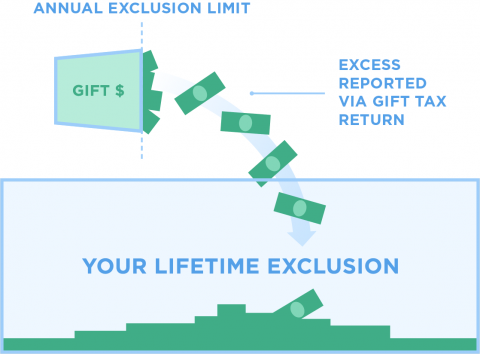Missed Tax Day? File as soon as possible to limit penalties. Try our fast, hassle-free tax filing. It's just $50.
Missed Tax Day? Try our fast, hassle-free tax filing. It's just $50.
Learn moreGift Tax: How It Works, Who Pays and Rates

Many or all of the products featured here are from our partners who compensate us. This influences which products we write about and where and how the product appears on a page. However, this does not influence our evaluations. Our opinions are our own. Here is a list of our partners and here's how we make money.
A gift tax is a tax owed on the transfer of money or property to another person while receiving nothing or less than full value in return.
If you give more than the annual gift tax limit, you may have to file a gift tax return, but this does not necessarily mean that you'll owe taxes on the gift.
The 2024 annual gift tax exclusion is $18,000. In 2023, it was $17,000.
Sending a $20 bill with a graduation card? No need to sweat the federal gift tax. But if you're dispersing millions worth of gifts over the course of your lifetime, you may have to cut a few extra checks to the IRS.
Jump to:
What is the gift tax?
The gift tax is a federal tax on transfers of money or property to other people who are getting nothing or less than full value in return. Two factors determine how much you can give away before owing taxes on the gifted amount: the annual gift tax limit and the lifetime gift tax limit.
If you exceed the annual gift tax limit (also known as the annual gift tax exclusion), you must file a gift tax return with the IRS to report it. The amount of your contribution that exceeds the annual limit will then be subtracted from your larger lifetime gift tax exclusion. Once you exhaust your lifetime exclusion, you may begin to owe gift taxes.
Simple tax filing with a $50 flat fee for every scenario
With NerdWallet Taxes powered by Column Tax, registered NerdWallet members pay one fee, regardless of your tax situation. Plus, you'll get free support from tax experts. Sign up for access today.
for a NerdWallet account
Transparent pricing
Maximum refund guaranteed
Faster filing
*guaranteed by Column Tax
How the annual gift tax exclusion works
The annual gift tax exclusion is a set dollar amount that you may give someone without needing to report it to the IRS. The threshold is typically adjusted to account for inflation each year. The 2023 annual gift tax exclusion was $17,000, and the 2024 annual gift tax exclusion is $18,000.
If you give away more than the annual exclusion amount in cash or assets (for example, stocks, land, a new car) to any one person during the tax year, you will need to file a gift tax return in addition to your federal tax return the following year.
That doesn’t mean you have to pay a gift tax — it just means you need to submit IRS Form 709 to disclose the gift.
The annual exclusion is per recipient, not the sum total of all your gifts. That means, for example, that you can gift $18,000 to your cousin, another $18,000 to a friend, another $18,000 to a neighbor, and so on in 2024 without having to file a gift tax return in 2025.
If you’re married, you and your spouse could each give away $18,000 in 2024 without needing to file a gift tax return in 2025. If you want to combine your annual exclusions to give someone $36,000, you can choose to take advantage of "gift splitting".
Gifts between spouses are unlimited and generally don’t trigger a gift tax return. Although, if the spouse isn't a U.S. citizen, special rules may apply.
Gifts to qualified nonprofits are charitable donations, not gifts.
Gift tax limit 2024
The 2024 gift tax limit is $18,000. For married couples, the limit is $18,000 each, for a total of $36,000. This amount is the maximum you can give a single person without having to report it to the IRS in 2025 on Form 709.
If you exceed the annual exclusion in 2024 and have to notify the IRS, you still might not have to pay any taxes, unless you have also exceeded the additional lifetime gift tax exclusion.
Gift tax limit 2023
The 2023 gift tax limit was $17,000. For married couples, the limit was $17,000 each, for a total of $34,000.
How the lifetime gift tax exclusion works
In addition to the annual gift tax exclusion, you get a lifetime gift tax exclusion. This means that any amount that you give over the annual limit is subtracted from your larger lifetime limit. Once you've gifted over your lifetime amount, you may begin to owe taxes.
“Think about buckets or cups,” says Christopher Picciurro, a certified public accountant and co-founder of accounting and advisory firm Integrated Financial Group in Michigan. Any excess “spills over” into the lifetime exclusion bucket.
The gift tax return that you need to file if you exceed the annual limit simply keeps track of that lifetime exclusion. So if you don't gift anything during your life, then you have your whole lifetime exclusion to use against your estate when you die.

» MORE: Learn how estate tax works
2024 lifetime gift tax exemption
The 2024 lifetime gift limit is $13.61 million. In 2023, the lifetime gift tax limit was $12.92 million. And because it’s per person, married couples can exclude double that in lifetime gifts.
For example, if you give your brother $50,000 in 2024, you’ll use up your $18,000 annual exclusion. The bad news is that you’ll need to file a gift tax return in 2025, but the good news is that you probably won’t pay a gift tax. Why? Because the extra $32,000 ($50,000 - $18,000) simply counts against your lifetime exclusion. Next year, if you give your brother another $50,000, the same thing happens: you use up your annual exclusion and whittle away another portion of your lifetime exclusion.
Another trick that can help people avoid an unwanted tax bill is simply keeping an eye on the calendar. In 2026, the lifetime exclusion amount will revert back to its pre-2018 level of about $5 million (as adjusted for inflation) per individual.
Who pays the gift tax?
The donor, not the recipient, typically pays the gift tax. According to the IRS, money or property that is transferred to another person without receiving anything in exchange is a gift. Gifts that exceed a certain value may be subject to a tax.
Do you pay taxes when you receive a gift?
In most cases, no. Assets you receive as a gift or inheritance typically aren’t taxable income at the federal level. However, if the assets later produce income (perhaps they earn interest or dividends, or you collect rent), that income is probably taxable. Also, keep in mind that while there is no federal inheritance tax, some states may impose their own.
» MORE: How capital gains tax works
Is the gift tax deductible?
Gifts of cash or property to family or friends are not tax deductible. Only charitable donations to qualified nonprofits may be tax-deductible.
How much is the gift tax rate?
Taxpayers typically only pay gift tax on the amounts that exceed the allotted lifetime exclusion, which was $12.92 million in 2023 and is $13.61 million in 2024. Gift tax rates range from 18% to 40%.
There are, of course, exceptions and special rules for calculating the tax, so check the instructions for IRS Form 709 for all the details.
Taxable amount | Rate of tax |
|---|---|
up to $10,000 | 18% |
$10,001 to $20,000 | 20% |
$20,001 to $40,000 | 22% |
$40,001 to $60,000 | 24% |
$60,001 to $80,000 | 26% |
$80,001 to $100,000 | 28% |
$100,001 to $150,000 | 30% |
$150,001 to $250,000 | 32% |
$250,001 to $500,000 | 34% |
$500,001 to $750,000 | 37% |
$750,001 to $1,000,000 | 39% |
$1,000,000 and over | 40% |
Common gift tax return triggers
Caring is sharing, but some situations inadvertently lead to a gift tax return, pros say.
Gifting large sums of money to family
If grandparents put, say, $40,000 in a 529 plan for a grandchild, that may trigger the gift tax exclusion because it's over the limit.
A special rule allows gift givers to spread one-time gifts across five years’ worth of gift tax returns to preserve their lifetime gift exclusion.
» MORE: Learn how inherited IRAs work
Paying for vacations, cars or other stuff
If you gift your child $40,000 to help with wedding costs or offer to pay for an expensive honeymoon, this could trigger a gift tax return.
If you’re paying tuition or medical bills, paying the school or hospital directly can help avoid the gift tax return requirement (see the instructions to IRS Form 709 for details).
Giving a laid-back loan
Lending money to friends and family can be tricky, and the IRS can make it even worse. It considers interest-free loans as gifts. Or, if you lend them money and later decide they don't need to repay you, that's also a gift.
Setting up joint bank accounts
“Let’s say you live by Grandma, so for convenience, we're going to put you on Grandma's bank account. Guess what just happened?” Picciurro says. “If you're put as a joint [owner] on a bank account with somebody and you have the right to take the money out at any time, essentially Grandma is giving you a gift.” This applies to joint accounts when the other owner is not your spouse.
 SoFi Checking and Savings Member FDIC |  CIT Bank Platinum Savings Member FDIC |  Citizens Access Savings Member FDIC |
|---|---|---|
APY4.60% With $0 min. balance for APY | APY5.05% With $5,000 min. balance for APY | APY4.50% With $0.01 min. balance for APY |
Bonus$300 Earn up to $300 with direct deposit. Terms apply. | BonusN/A | BonusN/A |
» Need more guidance? See our full roundup of financial advisors
On a similar note...




